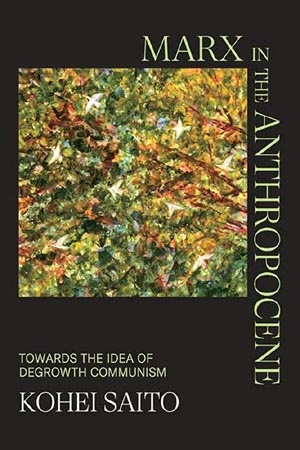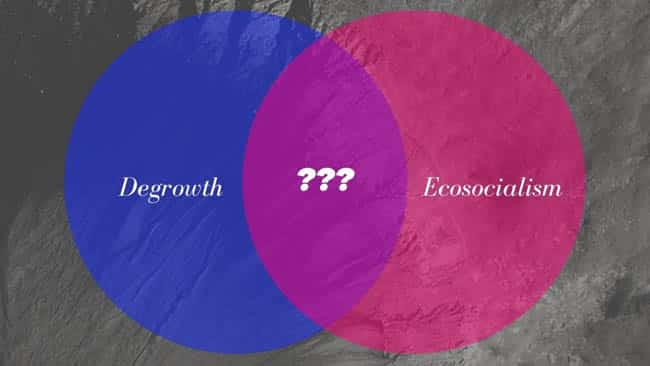by David Schwartzman

Kohei Saito’s Marx in the Anthropocene is an important contribution to the development of Marxist ecology. Climate & Capitalism welcomes constructive discussion.
Peter Boyle’s review of Kohei Saito’s book Marx in the Anthropocene: Towards the Idea of Degrowth Communism (Climate & Capitalism, June 23, 2023) provides an excellent account of its main points.
My critique can be summed up as: “Yes to degrowth communism” but likewise “Yes to good growth ecosocialism” to get there.
In the ecosocialist transition to degrowth communism that Boyle points to, the process of radically shortening the work week and liberating human creativity, sociality and social solidarity would begin to unfold.
Boyle quotes Hickel: “while it’s possible to transition to 100 percent renewable energy, we cannot do it fast enough to stay under 1.5°C or 2°C if we continue to grow the global economy at existing rates.”
A transition of this kind means that fossil fuels should be terminated faster than renewables can be created to replace them. But Hickel does not say what needs to grow — besides renewable energy supplies — and what needs to degrow, in this transition. Deconstructing economic growth into its components is essential to answer this question.
The degrowth brand was challenged by Josef Baum a decade ago:
“Walter Hollitscher, an Austrian materialist philosopher maintained, in discussions occurring in the late 1970s, that the only thing which should definitely grow is the satisfaction of needs. Basically, from a socio-ecological point of view the question of growth or de-growth is simple: there cannot be a yes or no answer. Some flows, stock, and activities should grow; others should not grow but decrease, for example, the production of weapons. It does not seem useful to use “de-growth” without indicating what should decrease, because the general use of the notion “de-growth” easily can easily also be understood as an undifferentiated attack on the standard of living and livelihood of many groups of people, especially broad low-income sectors of society.”[1]
I have critiqued degrowth from a similar position.[2] But Saito opposes any form of economic growth, even in an ecosocialist, post-capitalist regime: “Ecosocialism does not exclude the possibility of pursuing further sustainable economic growth once capitalist production is overcome, but degrowth communism maintains that growth is not sustainable nor desirable even in socialism.” (p. 209)
So it is disappointing since we are still embedded in fossil capitalism that Saito does not systematically deconstruct the degrowth discourse with these distinctions in mind, good versus bad growth in the context of a strategy to reach the goal of degrowth communism..
With the driver being multidimensional class struggle increasingly informed by an ecosocialist agenda under capitalism, ecosocialists commonly support vigorous degrowth of wasteful consumption particularly of the 1%, reliance on cars (even electric), mega-mansions, and especially the military industrial fossil fuel complex, coupled with the growth of renewable energy supplies, free electrified public transit, green affordable housing, agroecologies providing organic food, first rate healthcare and education of all, social governance of the economy. In other words, reaching for the ecosocialist horizon moving to a postcapitalist demilitarized world at peace.
Saito gives us a penetrating exegesis of Marx’s writings, especially of the late Marx, providing profound insights, reinforcing Malm’s critique of hybridism, with a valuable critique of the left “accelerationists” who expect technology by itself to bring the world communism. But Saito neglects to analyze the degrowth literature and its critique from the left.
For example, I am cited: “Many still believe that Marxism and degrowth are incompatible (Schwartzman 1996),” (pp. 209-210), But I don’t even mention degrowth, nor its incompatibility with Marxism in my 1996 paper,[3] and unfortunately Saito passes on any discussion of Georgescu-Roegen’s thermodynamics, which is foundational to degrowth discourse.
I assume that Saito may be referring to my more recent articles and books — e.g. our critique of Kallis (2017).[4] He cites Hickel and Kallis,[5] but not our critique.[6]
Instead we find Saito saying: “Technological progress can push limits back to some extent, but entropy increases, available energy decreases and natural resources get exhausted. These are objective facts that are independent of social relations and human will.” (p. 113)
But in a 100 percent global renewable energy world this entropy debt is paid to space as waste heat without contributing to global warming as now with 80 percent of energy derived from fossil fuel consumption. Further this renewable energy supply, greater than present primary energy consumption, can power a global circular economy necessary for degrowth communism, but this energy infrastructure must be created with real growth of this sector in the physical economy.
In this transition, starting under capitalism, the capacity for climate mitigation and adaptation along with elimination of energy poverty afflicting the global South must be created in the form of mainly wind and solar energy supplies.[7] Saito does not confront this challenge.
He quotes John Bellamy Foster:
“Society, particularly in rich countries, must move towards a steady-state economy, which requires a shift to an economy without net capital formation, one that stays within the solar budget. Development, particularly in the rich economies, must assume a new form: qualitative, collective, and cultural — emphasizing sustainable human development in harmony with Marx’s original view of socialism.”(p. 210) [8]
But rich countries, having the historic responsibility for generating dangerous climate change from their consumption of fossil fuels with the greatest impacts on the global South, now must be held accountable to finance and help implement the necessary wind/solar energy infrastructure especially in the global South, as well as converting their own physical economies to green cities, electrified public transit, agroecologies, etc, dismantling the military industrial fossil fuel complex.
Indeed, Saito recognizes the important role of renewable energy: “As a solution to climate crisis, solar panel and EVs are essential, but the associated battery technology is resource intensive, especially with regard to rare metals.” (p. 41)
But he does not recognize that there are solutions to address the serious challenge of extractivism in a robust wind/solar energy transition, namely using this energy supply for recycling metals including the huge supplies now embedded in the fossil fuel and military infrastructures in a circular physical economy, as well as substituting common elements for rarer ones (e.g., sodium for lithium in batteries) for renewable and energy storage technologies.[9]
Degrowth Communism is close in concept to Solar Communism both with a steady-state physical economy, realizing a 21st century update of Marx, “From each according to her ability, to each according to her needs” with her referring to both humans and nature. This corresponds to what I recently labeled as the future epoch of Solarcommunicene.[10] Saito’s book hopefully will help promote this future.
David Schwartzman is Professor Emeritus (Biology) at Howard University, and co-author of The Earth is Not For Sale: A Path Out of Fossil Capitalism to the Other World That is Still Possible (World Scientific, 2019).
Notes
[1] Josef Baum, “In Search for a (New) Compass – How to Measure Social Progress, Wealth and Sustainability?” Transform! European journal for alternative thinking and political dialogue, 2011.
[2] David Schwartzman, “ A Critique of Degrowth and Its Politics,” Capitalism Nature Socialism, 2012.
[3] David Schwartzman, “Solar Communism.”
[4] G. Kallis, “Socialism Without Growth,” Capitalism Nature Socialism (2017); D. Schwartzman and S Engel Di Mauro “A Response to Giorgios Kallis’ Notions of Socialism and Growth,” Capitalism Nature Socialism, (2019)
[5] J. Hickel, ‘Degrowth: A Theory of Radical Abundance’. Real-World Economic Review, (2019); G. Kallis, “Socialism Without Growth.”
[6] David Schwartzman, “Solar Communism.”; D. Schwartzman, “A Critique of Degrowth”; D. Schwartzman, “Degrowth in a renewable energy transition?”
[7] https://climateandcapitalism.com/2022/01/05/a-critique-of-degrowth/; http://theearthisnotforsale.org/dschwartzman_exeter42022.pdf
[8] J.B. Foster, “Marxism and Ecology: Common Fonts of a Great Transformation,” Monthly Review (2015).
[9] climateandcapitalism.com/2022/01/05/a-critique-of-degrowth/
[10] David Schwartzman, “An Ecosocialist Perspective on Gaia 2.0,” Capitalism Nature Socialism (2020).




Without discussing the degrowth issue, John Bellamy Foster provides a partial critique of Saito’s Marx in the Anthropocene: Toward the Idea of Degrowth Communism, in his article Engels and the Second Foundation of Marxism, https://monthlyreview.org/2023/06/01/engels-and-the-second-foundation-of-marxism/.
Foster says, “Saito’s attempt to establish a methodological break between Marx and Engels with respect to the concept of metabolism adopts a similar form for essentially the same reasons. Engels must be responsible for intentionally suppressing the term “natural metabolism” (and with it, the significance of the metabolic rift) in editing the third volume of Capital, since otherwise notions of the complementarity of Marx and Engels writings on ecology might carry the day, contradicting Saito’s contention that “Marx never really adopted the project of materialist dialectics that Engels was pursuing.”
What Saito says is more nuanced: “The key differences between Marx and Engels in their reception of the natural science can be summarized in the following way. Engels’s focus was the scientific recognition of the transhistorical law of nature in order to realize the realm of freedom. Engels’s dialectics of nature, founded on the philosophical dichotomy of consciousness/matter and idealism/materialism, advocated the ontological primacy of the latter… In contrast, Marx never really adopted the project of materialist dialectics that Engels was pursuing, even if he ‘may have given his friend moral support and encouragement…Of course, this difference between the founders of Marxism need not be overestimated. Marx did not completely reject Engels’s attempt to establish a materialist conception of nature.28 At the same time, the difference must not be underestimated because it is relevant to understanding why Engels did not fully understand the scope of Marx’s notebooks on natural science and modified the key passage on the metabolic rift in volume III of Capital. In fact, Engels’s understanding determined the reception of Marx’s theory in the successive generations.” (p.67, 68)
I don’t know whether other readers found the numerous abstractions in this article problematic or not, but I did. For anyone interested I have therefore used some of them in a fifth article of the Misunderstanding Marx series on http://www.critical-mass.net I have done so in order to illustrate the difference between them and what Marx’s revolutionary- humanist principles and recommendations really stood for.
Regards, Roy (royratcliffe@yahoo.com)
Thanks for your comment and link. However, I find your claims rather puzzling. However we interpret Marx,
we should do our best to use cutting edge science, in this case bearing on climate and renewable energy, to think thru a future and strategy to avoid climate catastrophes and achieve a just future for all on our planet.